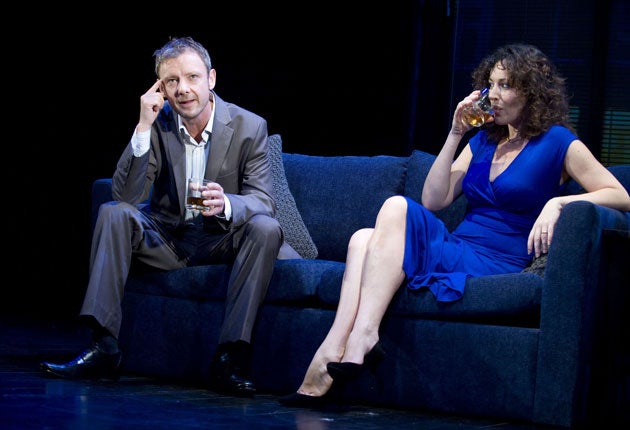Speaking in Tongues, Duke of York's Theatre, London

Your support helps us to tell the story
From reproductive rights to climate change to Big Tech, The Independent is on the ground when the story is developing. Whether it's investigating the financials of Elon Musk's pro-Trump PAC or producing our latest documentary, 'The A Word', which shines a light on the American women fighting for reproductive rights, we know how important it is to parse out the facts from the messaging.
At such a critical moment in US history, we need reporters on the ground. Your donation allows us to keep sending journalists to speak to both sides of the story.
The Independent is trusted by Americans across the entire political spectrum. And unlike many other quality news outlets, we choose not to lock Americans out of our reporting and analysis with paywalls. We believe quality journalism should be available to everyone, paid for by those who can afford it.
Your support makes all the difference.The Australian playwright Andrew Bovell scored a deserved hit with his kaleidoscopic ensemble play When the Rain Stops Falling at the Almeida earlier this year. Speaking in Tongues, written in 1996, and later adapted into the noirish movie Lantana, is about connections: the trickiness of making them with other people, in our own lives, and the failure to maintain them with the ones we ostensibly love.
All of which would be fine and dandy if Bovell and director Toby Frow didn't fall down when it comes to the important matter of creating a connection with the audience, and making us care about the the nine characters they deploy in a sort of elaborate game of theatrical join-the-dots.
In the first act, two couples with shaky marriages – Leon and Sonja, Pete and Jane – are in a neon-lit bar, toying with committing adultery. Unbeknown to each other, the four of them swap partners, and end up perched on beds in anonymous hotel rooms, chattering nervously as they embark on one-night stands. But while Leon and Jane go on to have sex, Pete and Sonja back away from it, and flee into the night.
During the fallout from their infidelities, Leon (John Simm) and Jane (Kerry Fox) both recount unsettling, mysterious stories involving missing people and pairs of shoes to their partners. In the second, less convincing, act the same actors play characters from these tales.
The play, which relies heavily on coincidence, is very artfully orchestrated. Yet the interlocking stories, with their themes of alienation, and the tug-of-war between intimacy and autonomy, seem oddly empty, and about as touching as a crossword puzzle.
Bovell's dialogue is often schematic and improbable. The naturalism of Toby Frow's direction only serves to highlight its artificiality, and the increasing unreality of the people speaking it. The characters, who all live in an unspecified city, toss around big words – love, betrayal, trust – which seem, after a while, to mean very little. This places an immense burden on the actors, who do their best to forge personalities out of ever-more cloudy language.
Fox doubles up as the nervy, unconfident Jane, who realises she wants out of her marriage, and a woman with a possibly malevolent relationship with her shrink. Juggling three roles, Ian Hart gives three slightly samey performances. Simm does better as the adulterous cop, Leon, who rediscovers his need for his wife. There's a beautiful moment between him and Lucy Cohu's Sonja, when a tentative dance segues into a kiss.
Speaking in Tongues wants to get under the audience's skin – even the furniture in Ben Stones's Edward Hopperesque design seems morose and moody. But Bovell doesn't make it easy to buy into his vision of creeping despair. Even as the smart plot of the play draws you in, it does everything it can to keep you at a distance, and at arm's length from its characters.
To 12 December (0844 871 7615)
Join our commenting forum
Join thought-provoking conversations, follow other Independent readers and see their replies
Comments